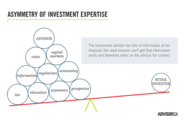-
About
- About Listly
- Community & Support
- Howto
- Chrome Extension
- Bookmarklet
- WordPress Plugin
- Listly Premium
- Privacy
- Terms
- DMCA Copyright
- © 2010-2025 Boomy Labs

 Sandi Martin
Sandi Martin
Listly by Sandi Martin
The best fee only apologists writing against the financial advice status-quo, here and in the United States.

"I'm very harsh on real estate agents. I'm not sure why. Maybe it's because of how the call every small house 'charming' and every run-down house a 'great fixer-upper'. Just once, I'd like them to show me a house and declare, 'This one's a piece of crap'."

"Happiness and moral duty are inseparably connected." -George Washington When I was at West Point, we had to learn a lot about the traditions of the Academy. Some of it was rather arcane ("How's the cow? Sir, she walks, she talks, she's full of chalk!

The financial plan you're getting for free from the personal banker and the investment advisor isn't really a financial plan tailored to you at all, and it's free because the full priced products - through up front and annual trailing commissions - are huge profit engines for the people and companies who sell them.

Real estate investors famously focus on location, location, location. If they started reading up on hiring a financial adviser, they might conclude the three most important things are fees, fees, fees. At least that's the view from the outside looking in after scanning various newspapers, magazines, and investor advocacy websites.

Comprehensive financial planning, Retirement planning, Estate planning, Tax planning , Insurance planning, Decision consultation, Portfolio reviews, Investment recommendations, Ongoing portfolio management

Calculating Savings (Photo credit: 401(K) 2013) If you watch TV, read the news or even glance at a passing billboard, you will find financial services companies represented by high paid actors or presenting "consumers" in a state of confusion that had all their problems solved by seeing this broker, following that [...]

Canadian regulators are taking a hard look at the relationship between investment dealers and their clients. Under consideration are rules that would hold advisors who deal with retail clients to a higher standard, and large-scale changes to fees and incentives.

As registered portfolio managers, my team and I treat clients' money as if it were our own. We have a fiduciary responsibility to them. I mention this for two reasons: firstly, as disclosure for the comments that will follow, and secondly, because responsibility to clients is at the heart of the debate over mutual fund fees in Canada.

Recently a business owner asked me to review his investment portfolio. He is currently with an Ameriprise financial advisor and his gut feeling tells him something is amiss. He is paying the advisor 1.6% in fees. First of all, this fee is quite exorbitant. For the size of his portfolio, he shouldn't be paying more...

Industry groups fight vigorously to protect the status quo By 2016, mutual fund firms and investment dealers will be required to tell their clients what they're paying and how they're doing. Our country's provincial regulators have also initiated discussions as to whether investment advisors should be held to a higher standard of fiduciary duty, rather than the current "best interests."

Reform of mutual fund fees is essential for Canadians' retirement security as the existing fee structure is unclear, conflicted and incomprehensible to consumers, resulting in high costs, poor consumer outcomes and a lack of effective price competition.

Investors should not need to consult their lawyers before signing on with an investment advisor The publication of a legal analysis commissioned by two investment industry groups, which suggests Canada is equal to or better than other countries when it comes to the rules governing the relationship between investment advisors and their clients, came under fire from investor advocates and academics on Tuesday.

Nobel Prize-winning economist Robert Shiller seems to be a friend of financial advisers, at least the good ones. Mr. Shiller on Wednesday said a lack of good financial advice was one of the problems that led to the financial crisis.

One of the most gratifying things about writing this blog is getting emails from young people who are just getting started in Couch Potato investing. "Without you," a 23-year-old wrote this week, "who knows what I would have continued to do with my money." I wish I could say I got started that young.

They say a cynic knows the price of everything and the value of nothing. That's one up on most investors, who know neither. Sorry for the blunt talk, but we're at a pivotal moment in investing as we begin 2013.

Editor's note: What follows is an examination of the broker-dealer business model, using the specific case of Edward Jones as an illustrative example. It's longer than normal, but I hope you'll find it well worth your time. -- B.R. In 2004, the highly regarded investment firm Edward Jones stumbled over allegations that it didn't disclose important conflicts of interest.

A financial advisor sent me an email after reading my column in The Globe & Mail titled, Would you give up 44 per cent of your investment over 25 years . It was actually one of the more cordial emails from financial advisors who were not happy with the column.

You're buying a refrigerator or flat-screen TV. You think you can rely on a retailer's advice to choose the best brand for your needs. Then, you learn the store recommends only products whose manufacturers have paid a cash incentive. Wouldn't you feel the advice is compromised?

Should financial advisers be banned from collecting commissions on mutual funds? That's been hotly debated for years, and in December the Canadian Securities Administrators (CSA) issued a discussion paper that considered the idea of imposing such a ban. Australia already did so in 2012, and the U.K. followed suit this January.

When hiring lawyers, plumbers, hairdressers or just about every other service provider, the terms of engagement are straightforward. You, the consumer, pay for services rendered. And if the service isn't performed, you don't pay. In the mutual fund industry, that's not how it normally works.

While MoneySense is intended to help empower individual investors, it's a rare person that needs absolutely no financial help or advice. This blog continually makes the point that while self-directed investors can lower costs by buying index funds or ETFs at discount brokerages, that doesn't mean they have to forgo financial planning help, advice or guidance.

Meet a mutual fund that makes good money and yet at the same time shows why we need to reform the way investors pay for funds and advice. It's the RBC Canadian Dividend fund, fourth-largest among mutual funds with assets close to $10-billion.

First place is a Cadillac, second place is a set of steak knives and third place is "you're fired." Anyone who has seen the movie Glengarry Glen Ross will remember Alec Baldwin's unconventional pep talk announcing a sales contest for a small-time real estate sales firm.

In a recent post, an anonymous commenter took me to task for my opinion that mutual funds should not be permitted to pay financial advisors. Rather than just rebut the commenter's argument, I want to use it to illustrate an important difference between good and bad financial advisors.
his article was originally published in September 2013. The impact of compounding fees struck a chord with readers (see " Investor knowledge continues to lag," Advisor's Edge Report, June 2013). Several wrote with concerns. Some couldn't believe the math. Others objected to the term "advisor's fee." Here are the calculations.

Fee only/advice only financial planner at Spring Financial Planning, ex-banker, curmudgeon.
Co-host with the really loud laugh on Because Money